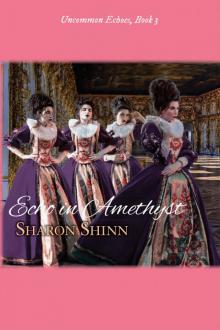- Home
- Sharon Shinn
Echo in Onyx Page 11
Echo in Onyx Read online
Page 11
He grinned over at me. “You’re a country girl. It seems like a reasonable assumption.”
“Until I was fifteen, I only knew the simple dances,” I confessed. “But that summer, we had a visitor who stayed at the inn for a month. She had to be fifty years old and not at all fashionable, but she’d spent half her life running a dance academy for young ladies. She had run low on funds and couldn’t pay for the rest of her trip, so she started dance classes in the village for any girl who was willing to pay. I got to attend for free, since she couldn’t afford rent on the room, either. Once she’d earned enough to finish her journey, she was gone, but we’d learned all the steps. At local weddings, we still play waltzes.”
Nico was still grinning. “But who do you partner up with, if she only taught the women?”
I laughed. “With each other! We all tried to teach our brothers and beaus, but they weren’t nearly as interested in learning.”
“No,” Nico said. “As a rule, a man would rather fight.”
“What about you?” I challenged. “Can you dance?”
He nodded. “My father was a low noble, as I think I told you, and my mother was determined that I should know every skill that fell to my station, so she insisted that I learn. I resisted as much as possible, and I’m not very good at it, but generally I don’t disgrace myself if a dance becomes inescapable.”
I rolled to my side and propped my head up on my left hand. “And how often does it happen that you are forced to dance?”
He laughed. “As infrequently as possible! But from time to time I attend royal balls in the role of extra dancer—filling in for a man who only has two echoes and who has solicited the hand of a woman with three.”
“How many of your dance partners are aware that they are waltzing with the king’s inquisitor?”
He turned his head to inspect me. “You mention my profession in almost every other sentence,” he said. “Do you find my occupation that horrifying?”
I rolled back onto my stomach and rested my head on my left fist, so that my chin was almost on the floor. I curled my right hand around one of the slats on the railing and stared down at the dancers again. It hardly mattered what I thought about his line of work. “I think it could be ugly,” I said. “For all that you justify the ugly parts.”
“I suppose any profession has less savory elements.”
“All jobs probably have elements that aren’t very pleasant,” I allowed, thinking about cleaning up a room at the posting house where the occupants had celebrated a little too enthusiastically. Nothing like day-old vomit to make you never want to eat again. “But many of them are still honorable.”
“Well! Now we’ve gotten down to the truth of it!” he exclaimed. His tone indicated outrage, but I was pretty sure he was amused. “I think you’re provincial, and you think I’m dishonorable.”
“Good thing you’ll be heading back to the royal city soon.”
“Not quite that soon,” he said. “I think the plan is to stay here three more days. And once we leave, we head to Alberta, not Camarria.”
I gave him a quick look. “But you’ll still be leaving Oberton.”
“We’ll still be leaving here,” he echoed. “Yes.”
I shrugged. “So.”
“Not for three more days. A lot can happen in that amount of time.”
I shrugged again and didn’t answer. But I didn’t pull away when he reached up and gently pried my right hand from the railing, then laced his fingers between mine. We lay like that for the longest time, side by side on the balcony floor, not speaking, not touching except for where our fingers intertwined. Every note of music that played for the duration of the ball seared itself into my brain as if to make certain I would never be able to forget a minute of that night.
CHAPTER NINE
In the morning, Marguerite wanted to visit the flower markets. Both of us had gotten to bed late and risen late, so there was no chance of sneaking out before anyone else was awake. But it was soon clear that sneaking was exactly what she wanted to do. We took a carriage to the markets, telling the coachman to park somewhere for a couple of hours because we planned to take our time picking out purchases. We had not spent five minutes winding between the flower stalls when Marguerite and her echoes all pulled out plain silk shawls and draped them over their heads as if to shield their faces from the sun.
“Come on,” Marguerite said, turning in the direction of the temple.
I muffled a sigh and followed. At least she’d had the forethought to give each echo a wrap of a different color and she’d released them enough from her control that they didn’t walk behind her in perfectly timed steps. But it wouldn’t be too hard to pick them out from the throngs of people on the street if anyone had been paying attention.
Once we arrived at the temple, we took our usual seats in back. Well, the echoes and I did—Marguerite stood in the aisle, staring at the echoes with eyes so fierce they seemed to burn.
“You must sit here, do you understand?” she whispered in a low, intense voice. “You cannot follow me. I will only be in the next building, not far at all. I will return as quickly as I can. Do you understand? You must stay.”
They rustled uneasily on the bench, one of them half-rising until Marguerite pushed her firmly back in place. “Stay here,” she whispered again, then turned and strode away without once looking back. A moment later, she disappeared through the door near the front of the sanctuary.
The echoes stirred and whispered, wringing their hands and bobbing their heads. The same one came halfway to her feet again, and this time I hauled her back. This must be Purpose, I thought. Always the first one to act, the first one to understand. She didn’t look at me as she settled back on the seat and I could feel the tension emanating from her coiled body. I didn’t know how to soothe her and I didn’t know how long Marguerite would be gone and I didn’t know what dangerous adventure she might be pursuing. I wanted to sigh and chitter and shake my head, just like the echoes, but I didn’t; I sat there, hands folded, head bowed, every muscle corded with readiness. It felt like the longest hour of my life.
This time, when Marguerite reappeared, she didn’t look particularly peaceful. She looked sad. Maybe she’s told him she has to stop this nonsense, I thought, following her and the others out of the temple, into the light, into the crowded and cheerful streets. Maybe this is the last clandestine visit we’ll have to make. I hoped so—but I was pretty sure I was wrong.
That evening, the governor and his wife hosted a dinner to which it seemed half of the city had been invited. As the event was held in the grand dining hall, there was no convenient balcony perch from which I could look down on the visitors. But since I had no specific function to fulfill during the meal, I could step outside to enjoy the cooler air of evening. I was not entirely surprised to find that Nico Burken was loitering behind the mansion, near the servants’ entrance, and that he, too, fancied a casual stroll through the nearby streets. Later, Marguerite said that the dinner had seemed endless, but I thought our slow promenade was much too short.
The next two days were, like Marguerite’s echoes, almost exact copies. A trip to the temple in the morning. An event at the mansion in the evening. A few hours of dalliance with Nico.
Clearly, Marguerite did not want to relinquish her lover after all. I had to say, knowing how quickly Nico would be riding away, I could sympathize.
On the fourth day after the ball, which was the last day the royal visitors would be in town, there was no chance to visit the flower markets—or the temple—as Lady Dorothea had scheduled activities that would keep Marguerite at her side for the entire day. I had plenty to keep me busy putting Marguerite’s wardrobe back in order because there had been very little time to clean or mend anything during the hectic pace of the past week. I chose a sofa in the sitting room and spread a half dozen garments around me so I could sew by the light of the picture window. I was only about halfway through my task when Marguerite and the echoes
returned and plopped down in nearby chairs.
“Back for a nap?” I asked, glancing up. Then added, with more concern, “What’s wrong? You look like you’ve been slapped across the face.”
Marguerite put a hand to her cheek, and all the echoes did the same. She must really be disturbed, then. She had told me it took her some concentration to let the echoes go free, so when they mimicked her this closely, I assumed it was because her thoughts were elsewhere. “Do I? That’s sort of what I feel like.”
I laid aside my sewing. “What happened?”
“The prince said—the prince wants me to go to Camarria—so we can get to know each other better.”
“Oh, my lady! Does that mean—”
She shook her head. “He’s not asking for my hand. Not yet. But if all goes well, he will ask for it.”
“But then—”
“I’m not the only one being invited to Camarria because he does not want to appear too particular in his attentions. There will be a dozen eligible women from across the Seven Jewels. We are expected to assemble in the royal city in about three weeks and stay for a month.”
“And at the end of that month?”
“If we find we get along—if his parents find me suitable—and, I suppose, if our fathers can work out their bargain—then he—then he—”
“Then he asks you to be his bride.”
She nodded dumbly.
I took a deep breath and let it out again. It was hard to know how to respond, whether to offer comfort or congratulations; every reaction seemed wrong. She could leave for Camarria the governor’s daughter, and return as the woman next in line to be queen. A deliriously exciting prospect for someone who desired such a life; a horrifying notion for someone who craved a different existence altogether.
“And if you don’t get engaged? What happens then?”
She made a fatalistic gesture. “Then I come home, to find my mother disappointed and my father furious. No! Worse! My father would be more convinced than ever that the western provinces must secede, and determined to whip up a rebellion with the support of Empara and Alberta. So there would be war and bloodshed and death, and all of it my fault.”
“Hardly your fault, not if your fathers are the ones who can’t come to terms,” I said in a dampening tone, since her voice had risen to the edge of hysteria. “Anyway, the provinces have been quarreling for years, and there hasn’t been a war yet. I don’t think the consequences will be so dire.”
“Maybe not,” she said a little more quietly. “Maybe I just come home and try to resume my old life until my father picks out someone else he thinks I should marry to give him political advantage.”
I tried to infuse a little hope into my voice. “Maybe you come home and your parents let you pick your own husband,” I said. “Wouldn’t that be nice? Can you think of someone you might want to marry?”
I said it in a playful tone, but it was clear she took the question with utmost seriousness. She lifted her head and stared at me, her blue eyes huge with longing and grief. Then she glanced away, down at her hands, and began plucking at the design embroidered into her skirt. “Oh, yes,” she whispered, “but I’ll never get the chance.”
“Are you sure?” I said in a gentle way. “Times change. People’s circumstances change. Someone who is unsuitable or unavailable might become acceptable and free.”
She looked up again, attempting to force her mouth into a smile. “It’s a nice thought. But I don’t expect it to happen. I need to push this person out of my heart.”
“Camarria might be just the place to do it,” I said, in what I hoped was an encouraging voice. “Maybe, if you don’t marry the prince, you’ll meet someone else in the royal city. Someone who’s young and handsome and rich—and has a large estate.”
“I don’t care about money and a big house,” she said. “A kind heart and a gentle temper are all I want.”
“You’ll care about a big house when you’re trying to find beds for your echoes!” I told her. “Unless you think they can curl up in front of the kitchen fireplace, like puppies on a blanket.”
Her smile was more genuine now, though still streaked with wistfulness. “If I lived in a small cottage with barely enough room to turn around, would you still come take care of me?” she asked.
“I would,” I said firmly. “Though I’m not sleeping on a blanket in front of the hearth. I at least need a cot of my own.”
“Well, we’ll do better than that for you in Camarria.”
“‘In Camarria’?” I repeated, puzzled.
“You’re coming with me, of course.”
I had been so focused on Marguerite’s predicament that I hadn’t even thought about what her news might mean for me. Suddenly I was overcome with so much excitement that I was speechless. Of course I would be traveling with Marguerite! Of course she would need her maid with her! I would be going to the royal city! I would get to see the king and queen, the spectacular palace, the famous bridges!
Nico would be there.
Goddess have mercy on my soul, Nico would be there. He must have been well aware that Cormac was considering Marguerite as a bride—and he had probably known that the prince would be inviting her back to the royal city. He must have realized that our light summer romance would be extended—by a month, it seemed, and possibly for a lifetime. For a moment I was tempted to advocate for Marguerite’s marriage to the prince. I’ve reconsidered. It’s your duty to marry to please your father. It’s your responsibility to save the kingdom from civil war. The prince is handsome, and you will be a beautiful queen. Marry him! Marry him now! But that was silly and selfish and even a little cruel. Besides, maybe I wouldn’t be so keen on Nico once I knew him better. But it looked like I would get the chance to find out …
“Well?” Marguerite demanded. “You are coming, right? If I have to go, you have to.”
I hopped up from the sofa just so I could sink down into a curtsey that practically brought my nose to my shoes. “My lady, I would be honored and delighted to accompany you to Camarria,” I said. “Thank you so much for bringing me! I know you don’t want to go—but I can hardly wait.”
I could hardly wait for the dinner hour, either, so I could discuss this turn of events with Nico. But there were several long hours in between. I continued mending her wardrobe while Marguerite napped, then we began the lengthy process of dressing her for dinner. She had saved her most spectacular ensemble for last: a sleek lavender gown accented along the deep neckline and cap sleeves with rows of dangling pearls. Most of her jewelry this night consisted of amethysts and pearls, though she insisted on wearing the new onyx bracelet despite my protest that it did not match. But her headband, covered with carefully preserved violets and snowdrops, was perfection.
The echoes wore a darker shade of purple—and headpieces fitted with net veils that drifted prettily over their faces. It was the first time Marguerite was trying out the new fashion accessory in public. Prudence didn’t like the veil; she kept tugging at the hem as if to pull it more tightly under her chin. Purpose found it annoying, I thought, as she repeatedly swiped her hand across her eyes as if to clear her vision. But Patience fooled with the placement of the headpiece until she had it exactly right, and then she stepped over to help Prudence adjust hers. I smiled as I watched.
Then I gaped at them. I could tell them apart! At this particular moment, as they were learning something new, I could see their distinct personalities. As soon as the stress passed, I was sure, they would all subside into anonymity again, since there was nothing except their behavior to differentiate one from the other. Still, I found it both amazing and a little unsettling that I had seen even this much separation between them.
“Oh, I do like the veils,” Marguerite said, surveying them critically. “They’ll cause a stir, don’t you think? But a lovely one.”
“I hope the echoes can manage to eat without getting food all over the netting.”
Marguerite laughed. “I hadn’t thou
ght about that. Well, we’ll see how it goes.”
I made a few minor tweaks to her dress, patted her hair one last time, and then saw her out the door as the echoes trailed behind
Five minutes later, I was slipping through the kitchen, deaf to the undercook’s muttered curse as she tried to scrape the leavings out of a pan of potatoes and scallions. I could have stayed to help, but I wanted to be outside. In the cool evening air—away from the chaos of the dinner party—on the street where some passing visitor might chance to be walking by …
Nico was waiting for me just around the corner of the mansion, standing in shadows thrown by the setting sun. At first I couldn’t see him because his clothes were so dark and the shade was so deep, but I knew he would be there. He was always there whenever I went looking for him. He was always watching from some hidden spot—
I shook my head and summoned a saucy smile. “I thought you might be here,” I said in a cheerful voice.
He took my hand and placed it in the crook of his bent elbow. “You knew I would be here,” he corrected. “My last night in Oberton.”
Without discussing any kind of plan, we started strolling down the street, skirting the main entrance of the mansion where carriages were even now rolling up and disgorging passengers.
“I have to give you credit, though,” I said, my voice warm with approval. “You do know how to keep a secret.”
“Uh-oh,” he said. “I have a feeling this is a secret I should have shared.”
I shot him a quick, accusing glance. “You knew, didn’t you? That Marguerite would be invited to Camarria—and I would be going, too. You knew that this wouldn’t be the last time I’d ever see you. You could have told me.”
“Would it have changed anything?” he demanded. “Would you have spent more time with me—or less?”
“I don’t know, but at least I wouldn’t have felt so bleak about everything.”
He grinned. “Maybe I liked you feeling bleak. Maybe I thought that would make you realize how much you were going to miss me. How much you like me.”

 Jenna Starborn
Jenna Starborn Troubled Waters
Troubled Waters The Thirteenth House
The Thirteenth House Reader and Raelynx
Reader and Raelynx Angel-Seeker
Angel-Seeker Archangel
Archangel Jeweled Fire
Jeweled Fire Nocturne
Nocturne The Shape-Changer's Wife
The Shape-Changer's Wife Still Life With Shape-Shifter
Still Life With Shape-Shifter Quatrain
Quatrain Fortune and Fate
Fortune and Fate Angelica
Angelica Summers at Castle Auburn
Summers at Castle Auburn Echo in Amethyst
Echo in Amethyst The Turning Season
The Turning Season Mystic and Rider
Mystic and Rider Heart of Gold
Heart of Gold The Shape of Desire
The Shape of Desire Echo in Onyx
Echo in Onyx Royal Airs
Royal Airs Gateway
Gateway The Safe-Keeper's Secret
The Safe-Keeper's Secret Wrapt in Crystal
Wrapt in Crystal Unquiet Land
Unquiet Land Jovah's Angel
Jovah's Angel Dark Moon Defender (Twelve Houses)
Dark Moon Defender (Twelve Houses) Mystic and Rider (Twelve Houses)
Mystic and Rider (Twelve Houses) Fortune and Fate (Twelve Houses)
Fortune and Fate (Twelve Houses) Reader and Raelynx (Twelve Houses)
Reader and Raelynx (Twelve Houses)